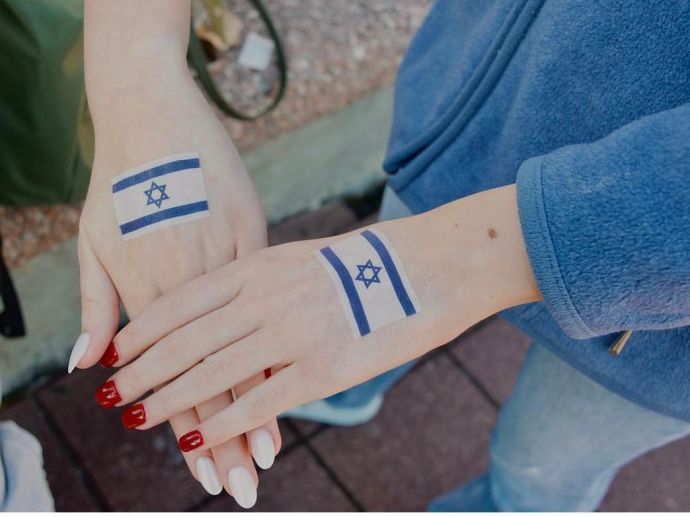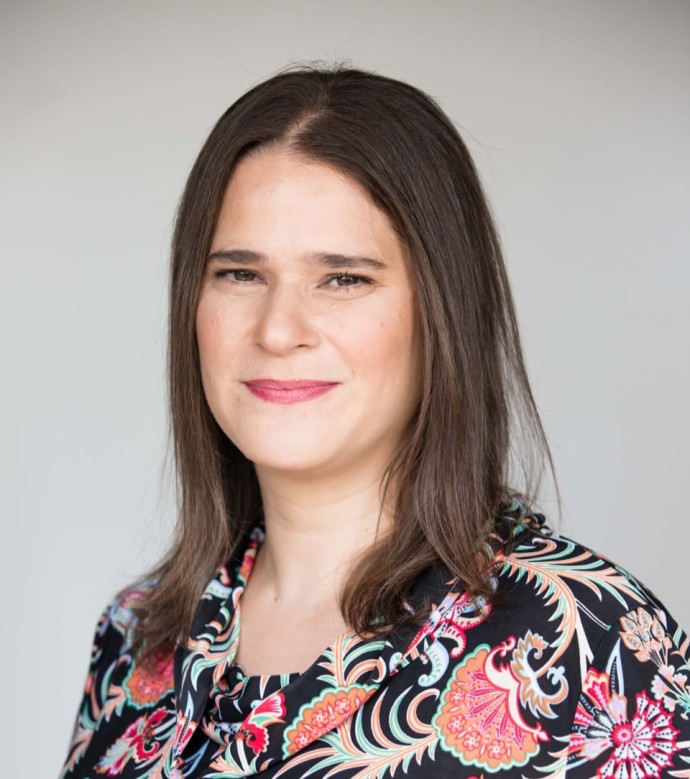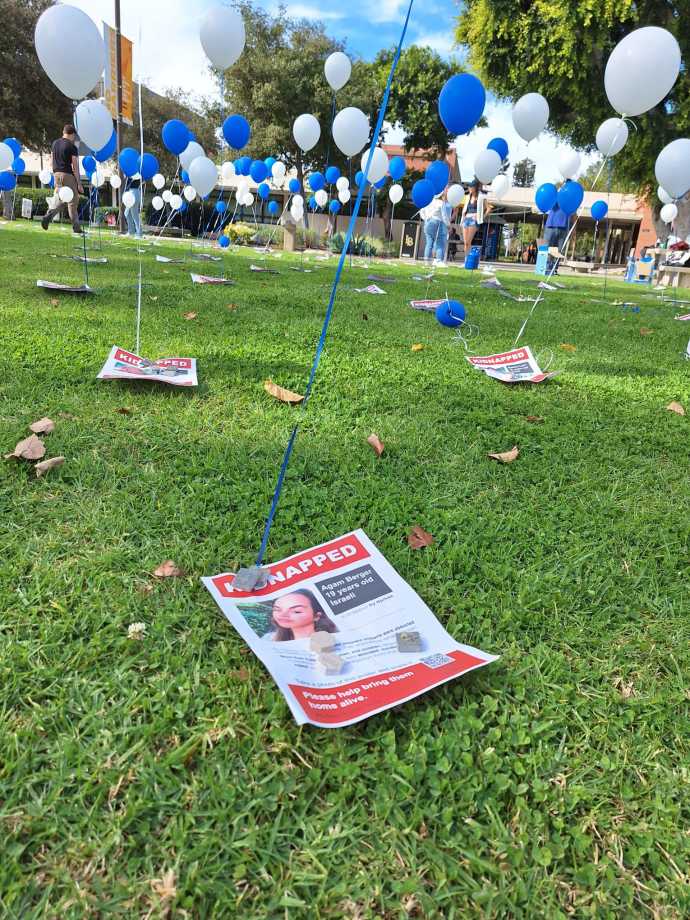According to a survey from the Anti-Defamation League (ADL) Center for Antisemitism Research, Hillel International, and College Pulse, while 63.7% of Jewish students pre-Oct. 7 felt “very” or “extremely” comfortable with others knowing they are Jewish, now only 38.6% feel the same. All data points have also revealed a dramatic increase in antisemitic incidents across the U.S.
Recognizing the need to support Jewish college students in this hostile and challenging reality, The Jewish Agency for Israel is working to maintain an authentic and engaging Israeli presence on campuses while supporting pro-Israel students through the Jewish Agency Campus Israel Fellows program.
The Israel Fellows are the dozens of young Israeli professionals who serve at colleges and universities in the US, Canada, and around the world every year. They spend two to three years on campus, helping students create meaningful relationships with Israel as well as fostering a sense of pride and courage to be proudly Jewish and unapologetically pro-Israel at their schools.

Israel Fellows use engagement, education, and experiences to reach as many students as possible and maximize their impact. Further, Israel Fellows substitute curiosity for indifference and education for ignorance and provide students with the opportunity and motivation to form a real relationship with the true, authentic Israel and with Israelis.
“While it has always been difficult to support students in their Jewish journey and in building their relationship with Israel, it has never been as difficult, and as critical, as it is in this moment,” said Nati Szczupak, Director of the Jewish Agency Campus Israel Fellows. “As they face surging threats on campus, students are more eager than ever to connect with their Jewish community, with Israel, and with each other. An Israel Fellow functions as the friend and mentor that brings them together, providing a valuable resource for those looking to learn about, engage with, and support their community and Israel.”

Cultivating solidarity and connection with Israel
Amid rising antisemitism since Oct. 7, the most significant shift on campus is actually coming from the Jewish community itself, rather than from its critics and adversaries.
“October 7th is the moment people realized that we are one community, we are one people, and the safety and wellbeing of Israel is a topic we should be concerned about,” said Yonatan, the Israel Fellow at a prominent university in northern California.

Prior to Oct. 7 and particularly since “Operation Guardian of the Walls” in May 2021, students on this campus commonly did not want to be associated with Israel or programs carrying Israel’s name. Yet in recent months, pro-Israel students have been more proactive in organizing initiatives that demonstrate solidarity and foster connection with Israel, according to Yonatan.
“Instead of me being the person who initiates the ideas for activities, we now have more students who are offering their ideas and are eager to be active,” he said.
For instance, he noted that when pro-Palestinian students built a tent on campus, pro-Israel students took it upon themselves to raise the funds to construct their own tent. This tent has become a new hub for student-initiated activities, such as an event with a speaker who shared his firsthand account of rescuing Israelis from kibbutzim on Oct. 7.
Israel Fellows are young Israeli professionals who serve at colleges and universities in the US, Canada, and around the world every year
In contrast to Yonatan’s university, the Israeli-Palestinian conflict is not normally a highly contentious issue at this university in Pennsylvania. But this war has been “the first time you could feel that uncomfortable feeling on campus,” said Efrat, the Israel Fellow there.
During the initial days of the war, Jewish and pro-Israel students wanted to be together “because they felt like they only had each other,” she said. Jewish organizations on campus collaborated on a rally where attendees sang Hatikvah and prayed for the hostages held in Gaza.
“We realized we are one nation and one group of people who need to be there for each other, that it’s not the time to be separated and organize events on our own,” said Efrat. “We needed to be together.”
In the ensuing weeks of the war, students sought to come together in more substantive ways, meaning that program organizers needed to “reinvent ourselves and figure out a way to adjust our routine,” she explained. Specifically, a wartime routine should “teach students how to face threats, feelings, and comments in general” and also give them meaningful ways to gather,” she said. One example is the Cafe Ivrit program, where students speak Hebrew together. Once the war started, students began writing Hebrew-language letters to Israeli soldiers.
“We used the knowledge we had built and brought it into practice,” she reflected.
The initiatives of a leadership network that brings together student leaders on dozens of college campuses to share ideas and best practices surrounding the discourse and climate on Israel have also gained significance in the wake of Oct. 7. One such program is the Hillel International Content Creator Forum, which gives students tools for creating Israel-centered content on social media and other platforms with the goal of countering antisemitism and raising awareness about the Jewish state’s positive attributes. The Israel Fellow there, Or, has visited dozens of pro-Israel communities on campuses without an Israel Fellow since Oct. 7 to provide them with continued support.
“We all support each other, and we all share information,” he said. “We help these different leaders navigate the environment at their particular school.”
He shared that the network encourages student leaders to become more vocal about Israel, “which is tough because in many places, as you’d imagine, they feel very threatened and receive death threats. Some are taking their kippah off or removing mezuzas from their doors. I try and help them take more initiative when they feel comfortable to do so.”
Fostering engagement with non-Jewish students
Jewish students are hardly the only ones feeling the impact of the current war. According to the aforementioned ADL/Hillel/College Pulse survey, many non-Jewish students are erroneously assumed to be Jewish – and among them, 46% reported being targeted based on their assumed Jewishness. Since Oct. 7, the study found that the proportion of non-Jewish students assumed to be Jewish has increased from 7.2% to 12.7%, and that of this group, 29.5% reported being targeted by offensive anti-Jewish remarks.
The Israel Fellows believe that this climate makes allyship between Jewish and non-Jewish students more important than ever. Efrat said that at her campus, she was among the organizers of a session with non-Jewish student leaders who had reached out to the pro-Israel community, checking in on their wellbeing at this time and expressing interest in learning how they can help.
‘October 7th is the moment people realized that we are one community, we are one people, and the safety and wellbeing of Israel is a topic we should be concerned about’
At his campus, Yonatan organized a dinner with non-Jewish student leaders – some of whom were scheduled to travel to Israel in December (the trip was canceled), and others who traveled to Israel with Yonatan last year. He said the objective was to strengthen relationships with these student leaders, especially the ones who have not yet visited Israel, “so they can be our allies when we need them.” One student at the meeting who had been to Israel spoke about Kibbutz Kfar Aza and how concerned she was because she had met someone from there on last year’s student trip.
“It was a positive experience of allyship,” said Yonatan.
Ultimately, Yonatan feels that serving as an Israel Fellow at a time of unprecedented challenges also makes the work more fulfilling than ever. From programming to relationship-building, he said, “You’re wearing so many hats, but you feel rewarded by the support you give to people.”
This article was written in cooperation with The Jewish Agency.
* In keeping with maintaining the safety of Israel Fellows on campus, ‘The Jerusalem Post’ has omitted last names and the location of the Fellows who were interviewed in this story.
